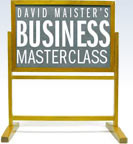

TITLE | TIME |
Justifying the Company | (16:49) |
In an organization where every decentralized operating unit is responsible for its own strategic plan, what is the role of the company itself? This seminar explores how to ensure that the company or firm acts as more than just a holding company.
RELATED RESOURCES:
Blog Discussions
- Does the Network Work?
- Re-engineering a Professional Business
- Does Your Organization Add Any Value? How Do You Know?
- The Branded Free Agent Hub
- Are Law Firms Manageable?
- Warlords and Dickensian Factory Owners
- The Best Places in the USA to Work
NOTES FOR THE EPISODE:
Timeline:
00:11 —
In this weeks’ seminar, entitled Justifying the Company, I’ll explore how companies can make sure that they are more than the sum of their parts, more than just a federation of people or business units sharing office space or ownership. At the other end of the size scale, the same question becomes, how do we ensure that national or regional firms are something more than a set of country practices only operating under a common name.
02:16 —
In every one of these situations, the challenge exists to make sure that the company or firm is more than just the sum of its parts.
There are a number of possible answers, including the following traditional alternatives:
First, there are things that could be SHARED across boundaries, justifying all the separate units belonging to the same network or firm:
- techniques for disseminating knowledge, skills and experiences
- shared investments in shared tools, methodologies, templates, research, etc.
- rapid, timely access to the skills of others in different units
- joint procedures to produce well-trained employees
- a high level of referrals, cross-selling and access to the client (or customers) of other units
- spreading the benefits and savings of fixed cost items like support staff and systems (including technology) to facilitate conduct of the business
04:19 —
A second way in which a company can add value is through a unique or special approach to management. If the company’s top people are better at bringing out the best in the performance of the units, then management itself can be a major competitive advantage. There are two common versions of this.
08:15 —
Let’s take another perspective here, using a different lens to examine the ways a company or network can add value. First, the network can be valuable by helping the individual business unit perform its own tasks better. Call this the �individual empowerment� method, because it aims to make each business unit more empowered to serve its own clients better because of membership in the network.
10:58 —
Let’s turn to the issue of collective action between operating units, trying to win and serve bigger and better clients through joint activities.
13:48 —
Before we finish, we should address one more topic. Branding.
15:45 —
This concludes JUSTIFING THE COMPANY the 8th episode in my 14-part series, Strategy in Professional Businesses.
Upcoming seminars in this series will focus on creating an adaptive firm, how companies should add value, and how to think about mergers, geographic expansion and diversification.

















